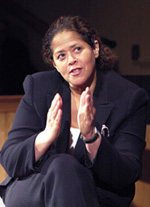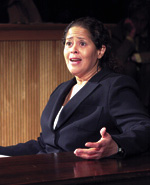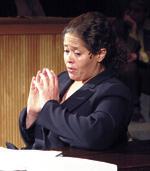
|
and patients in 'Rounding It Out'
Donning and shedding a white medical coat, Anna Deavere Smith transformed herself from physician, to patient, to physician again as she illuminated the inner lives of those on both sides of the stethoscope in her one-woman theatrical piece "Rounding It Out" at the School of Medicine.
Winner of an Obie, a Drama Desk Award and a MacArthur Foundation Fellowship Award, Smith came to Yale as the Daniel James Memorial Visiting Professor in the Department of Internal Medicine. A playwright as well as an actor, Smith gained national attention for "On the Road: A Search for American Character," plays she created by interviewing ordinary people across America. She currently serves on the faculty of New York University.
Smith spent her first days at the Yale medical school interviewing nearly two dozen doctors, patients and their families. She then incorporated those conversations into her two performances of "Rounding It Out" -- the first presented for physicians, students and staff during Medical Grand Rounds on Nov. 16 in Fitkin Amphitheater; and the second staged for the University community and the general public the following day in Harkness Auditorium. The performances included the singers Suzzy Roche of the Roches and Lynette DuPre.
"The goal of her performance is to illustrate how better to hear what patients are saying and to help us gain a better understanding of the struggle patients, especially those from the lower socioeconomic group, go through in dealing with their illness," explains Dr. Asghar Rastegar, professor and associate chair for academic affairs.
In her show, Smith did deft impressions of many of the Yale physicians and patients she had met. One moment she was Dr. Gerald Friedland, clinical professor of epidemiology and public health and director of the AIDS program, explaining in a contained, frustrated voice that his patient was making it impossible to treat her because of her untruthfulness. The next minute Smith was the patient, talking about a childhood of sexual exploitation that made her distrust the world.
Smith also portrayed a very tired Dr. Forrester Lee, associate professor of internal medicine. As Lee, Smith explained how a young African-American patient awaiting a transplant believed there would be none for him because of his race and said, "I can't tell you the joy I felt when I could walk in the room and tell him there was a heart for him."
Ruth Katz, associate dean of administration at the medical school, spoke through Smith about her own illness and hospitalization. As medical resident Dr. Nancy Kim, Smith talked in a clipped voice about being a young, petite Asian woman in a doctors' world. The other Yale physicians Smith portrayed -- Dr. Barbara Burtness, associate professor of internal medicine and medical oncology, and Dr. Ralph Horwitz, the Harold H. Hines Jr. Professor and chair of internal medicine -- were recognizable immediately to the medical school community by their voices and mannerisms. This was especially true of her portrayal of Horwitz since Smith borrowed his trademark eyeglasses with the confetti frames for her show.
Horwitz, who is also associate chair of academic affairs, said that despite advances in medical technology, the heart of medicine remains the doctor-patient relationship. "That relationship is all about storytelling," he said. "We want our physicians to remember that they're part of their patients' stories."
Among the most poignant pieces in Smith's show were those about patients who were frightened, bewildered and confused: a grandfather, his body withering as he awaited a transplant; a young woman living an outwardly normal life overshadowed by her AIDS diagnosis; a woman diagnosed with multiple sclerosis unclear about when she would become debilitated.
"The artist," Smith said at one point, "creates a fiction to illuminate a truth."
Smith also noted that what struck her during the interviews with Yale patients was the randomness of illness. "You could (suddenly) get some information that is going to dramatically change your life -- change your identity, who you think you are," she said.
-- By Jacqueline Weaver
T H I S
Bulletin Home
 W E E K ' S
W E E K ' S S T O R I E S
S T O R I E S![]()
 $2.5M grant boosts study of drug abuse in women
$2.5M grant boosts study of drug abuse in women![]()
![]()
 National carillon guild taps top-rung student 'ringers'
National carillon guild taps top-rung student 'ringers'![]()
![]()
 Tufte warns against 'display debris' in design
Tufte warns against 'display debris' in design![]()
![]()
 Actress gives voice to Yale doctors and patients in 'Rounding It Out'
Actress gives voice to Yale doctors and patients in 'Rounding It Out'![]()
![]()
 Law School symposium examines U.S. relations with Colombia
Law School symposium examines U.S. relations with Colombia![]()
![]()
 Mental hygiene department celebrates 75 years
Mental hygiene department celebrates 75 years![]()
![]()
 MEDICAL SCHOOL NEWS
MEDICAL SCHOOL NEWS Team uses primate's own cells to repair spinal cord injury
Team uses primate's own cells to repair spinal cord injury![]()
 Research shows nosebleeds may be sign of blood disorder
Research shows nosebleeds may be sign of blood disorder![]()
 Study: New anti-psychotic drugs may help schizophrenics . . .
Study: New anti-psychotic drugs may help schizophrenics . . .![]()
 Studies testing the power of light to relieve depression
Studies testing the power of light to relieve depression![]()
 Researchers say taking aspirin still a good way to prevent heart attacks
Researchers say taking aspirin still a good way to prevent heart attacks![]()
![]()
 Gift Gallery: A Look at What's on Sale at Yale's Museums This Holiday Season
Gift Gallery: A Look at What's on Sale at Yale's Museums This Holiday Season![]()
![]()
 Drama School stages Brecht's 'folk tale'
Drama School stages Brecht's 'folk tale'![]()
![]()
 Playreading festival to feature works by drama students
Playreading festival to feature works by drama students![]()
![]()
 Architecture forum to explore future of older public buildings
Architecture forum to explore future of older public buildings![]()
![]()
 Work of French critic Roland Barthes is subject of symposium
Work of French critic Roland Barthes is subject of symposium![]()
![]()
 New works by noted digital artist Paul Kaiser will be previewed at DMCA event
New works by noted digital artist Paul Kaiser will be previewed at DMCA event![]()
![]()
 A mission for education
A mission for education![]()
![]()
 Campus Notes
Campus Notes![]()
![]()
 In the News
In the News![]()
![]()
 Yale Scoreboard
Yale Scoreboard![]()
 |
| Visiting on Campus
Visiting on Campus |
| Calendar of Events
Calendar of Events |
| Bulletin Board
Bulletin Board![]()
Classified Ads |
| Search Archives
Search Archives |
| Production Schedule
Production Schedule |
| Bulletin Staff
Bulletin Staff![]()
Public Affairs Home |
| News Releases
News Releases |
| E-Mail Us
E-Mail Us |
| Yale Home Page
Yale Home Page

